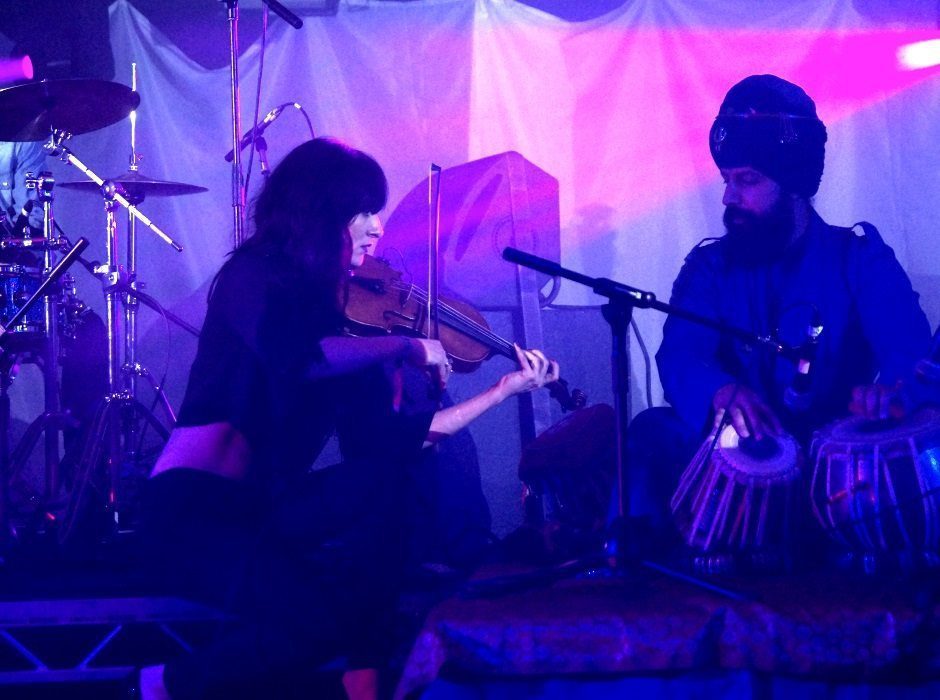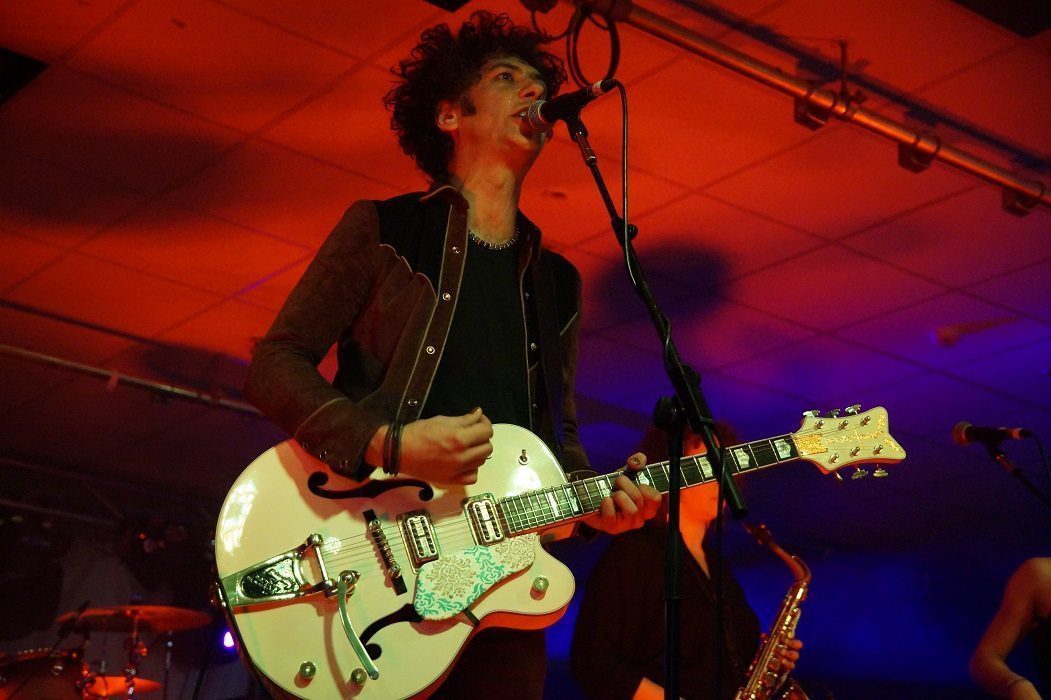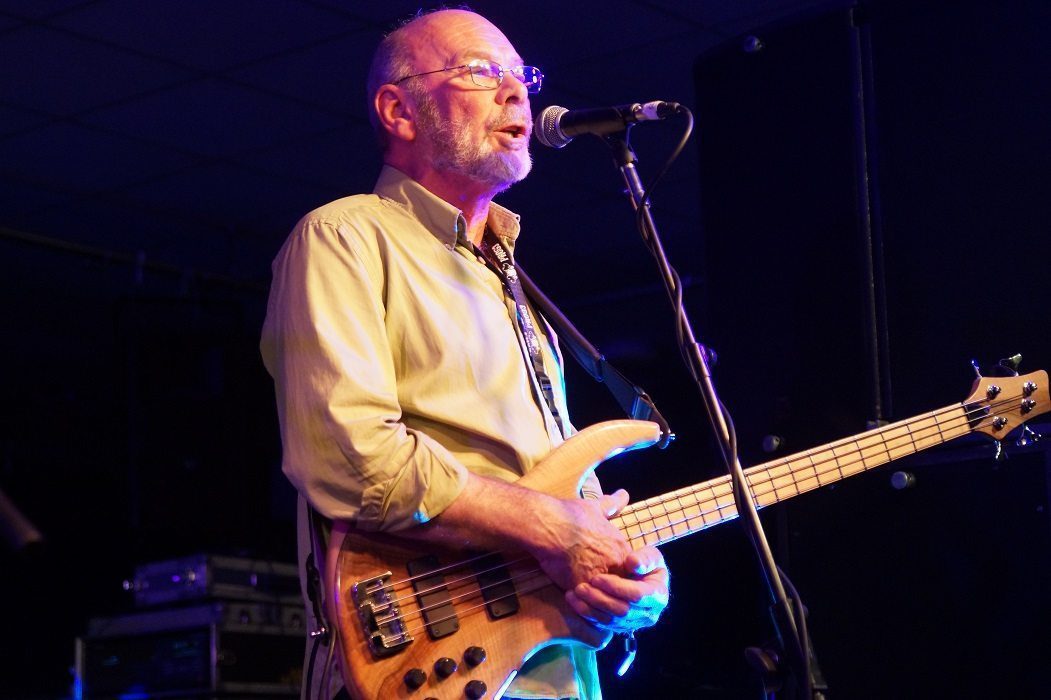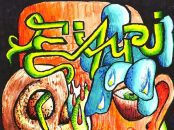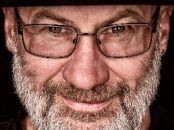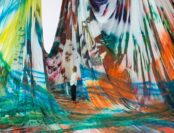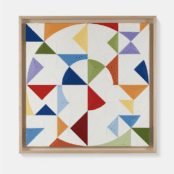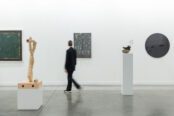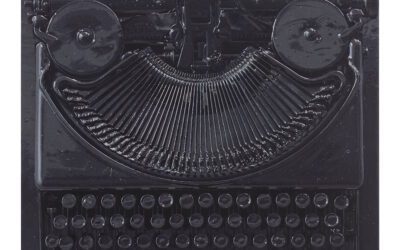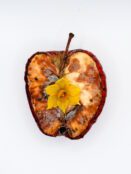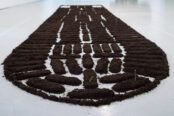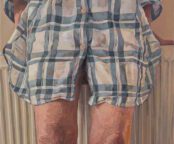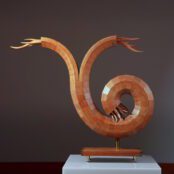[dropcap style=”font-size:100px; color:#992211;”]HRH[/dropcap] Prog is now in its third year, and its second at Hafan-Y-Mor (the former Butlins holiday camp just outside Pwllheli in north Wales).
Pwllheli is a long way from anywhere at the far end of a winding single-track railway line. The train stops many, many times at little request stops, but only if you know how to pronounce the station. By the time I finally got there after a whole day’s travelling I missed the opening band. But I did catch most of The Dream Circuit‘s set, with a space-jam sound that owed a lot to Ozric Tentacles.
Knifeworld were the most eagerly anticipated band of the Thursday night. They opened with a brand new song which Kavus Torabi dedicated to his great friend, the late Daevid Allen of Gong. With his white and gold Gretsch guitar, Torabi looks most un-prog, but with Zappa-style horn orchestrations, psychedelic soundscapes and layered vocal harmonies, the music is as progressive as it gets. There were one or two who didn’t ‘get’ what they do, implying they’re not “proper prog”, but that’s their loss. Knifeworld are the real thing.
The Skys, hailing from Lithuania had a far more traditional prog sound (is that an oxymoron?), but were very good at what they did. They displayed some strong Floydian atmospherics at times, with a harder-rocking edge at others. Highlights were a great keyboard sound with big washes of Hammond, and one guitar solo in particular that was brain-melting.
Friday kicked off with Kitten Pyramid, a foursome playing psychedelic rock with two bassists and therefore a lot of bottom end in their sound. That, combined with moments of bluesy guitar, came up as meld of “Albatross” and “War Pigs”. As the sole completely unfamiliar act on the day’s bill, they made a good first impression.
Next up was Sanguine Hum. Despite their reputation on record, with intricate arpeggios and layered atmospherics that have drawn comparisons to Porcupine Tree, they’d previously failed to convince live (at times coming over like Thom Yorke fronting the Vision On gallery theme). This time they were much better, with a set drawing heavily from their latest album The Weight of the World, a meatier sound with a bit more passion. Their stagecraft still needs work, but they’re now orders of magnitude better live than when they started.
A couple of weeks before the festival Touchstone announced that frontwoman Kim Seviour was leaving the band, and they were going on indefinite hiatus while the remaining members worked on other projects. This festival was to have been the band’s final live appearance, though popular demand saw the band announce a couple of headline farewell shows later in the year. Farewell or not, it was a roof-lifting performance, with hard rock-focussed set that emphasised their shorter, punchier material rather than their epics, ending in a monstrous version of “Wintercoast”. Even though they were only third on the bill, this was a headline-quality set.
Lifesigns, fronted by keyboard player and singer-songwriter John Young were the closest band on the bill to the archetypal neo-prog sound, with swirling harmonies, keyboard flourishes, and melodic overdriven guitar lines. They delivered a tight and passionate set of strongly song-focussed material drawn largely from their eponymous album. After decades as a sidesman for some far bigger names, it’s good to see John Young getting some recognition fronting a band himself.
Anne Phoebe was something completely different, a violinist leading an all-instrumental band that included Simran Ghalley on Tabla alongside more traditional rock instruments. Their kaleidoscopic sound cannot be contained within any traditional genre pigeonholes, seamlessly blending elements of rock, classical, Celtic folk, jazz and world music. Anne Phoebe herself is not only a stunning virtuoso musician but has a dramatic stage presence to match.
The Enid are a national treasure. Over their long and illustrious career playing what often amounts to classical music played on rock instruments they, perhaps more than anyone else. embody the spirit of everything progressive music is about. Their set wasn’t quite as rock-orientated as some of their recent festival sets perhaps, but they’re mesmerising if you “get” what they do, and Joe Payne has matured into a very impressive frontman. His falsetto showcase “The One and the Many” from 2012’s Invicta was stunning, and you could have heard a pin drop in the audience. With leader Robert John Godfrey likely to have to step down for health reasons in the relatively near future this is a band that needs to be seen while they’re still around in the current form.
It fell to Mostly Autumn to headline Friday’s show, and disaster struck fifteen minutes before they were due on. While setting up his kit, drummer Alex Cromarty fell and broke his hand. But powered by a combination of adrenalin and painkillers he managed to play a hastily-rearranged set one-handed. Even with three-quarters of a drummer, this was still a powerful set, starting with a low-key opening with Floydian ballad and flute showcase “The Last Climb” and ending with the emotional punches of “Questioning Eyes” and “Heroes Never Die”.
Though by necessity they were only able to feature a couple of songs from their masterpiece “Dressed in Voices”, the set can only be described as a triumph over adversity.
Saturday started with the guitar-shredding metal of Collibus, just the thing needed to wake everyone up. Although their twin-guitar sound was more straight metal than prog, and quite old-school, a tight performance and some strong songs made a good impression. In contrast, Agent had a more streamlined modern sound with elements of metal and alternative rock.
Landskap were the discovery of the weekend, with a superb late 60s/early 70s vibe with elements of Black Sabbath, The Doors and Uriah Heep, with a guitarist worshipping at the altar of Tony Iommi and a singer channelling Jim Morrison. But after them came the low point of the whole weekend. Black Peaks were truly awful, alternating between very bad death metal and generic indie-rock. The singer was painful to listen to, and it’s difficult to decide which was worse, his cookie-monster-with-laryngitis screaming or his embarrassing out-of-tune clean vocals.
Things got far better with Jump, who played one of the best sets I’ve seen them do. They’re a hard band to classify, with elements of prog, hard rock and folk with a strong emphasis on John Dexter Jones’ storytelling lyrics. Tonight the played a rocked-up set with a lot of energy, with songs about real-life subjects ranging from shipwrecked sailors to Twisted Sister fans, with “Down Three Times” a particular highlight. They even threw in a few bars of “Whole Lotta Love” and “Running Free” thrown in for good measure.
Now back in action following Christina Booth’s cancer treatment, Magenta were simply stunning. They’ve always been a band for whose recorded output doesn’t prepare you for the intensity of their live performances. Christina was on superb form vocally, with the greatest emotional depth of any performer of the weekend; “Pearl” in particular bought a lump to the throat and a tear to the eye. And given the complex nature of their music, it’s always amazing just how tight they always are live.
In true prog fashion, Christina followed the words “This is our last song” with “…but it’s a long one”, before ending the set with the epic “Metamorphosis”. This was the performance of the festival.
70s folk-rock legends Steeleye Span took the special guest spot on Saturday, With Maddy Prior, one of the greats of the folk world, on excellent form and a virtuoso violin player in Jessie May Smart they delivered another thoroughly entertaining set. They went from traditional folk ballads about young innocents abducted by the Queen of the Faeries to more rock-orientated songs from the most recent album “Wintersmith”, inspired by the writings of the late Terry Pratchett. They did insist that they would only play their hit “All Around My Hat” if the audience helped sing it. When first announced they had seemed an odd band to appear high on the bill at a prog festival, but they ultimately turned out to have been an inspired choice.
Rick Wakeman‘s solo set was a strange way to end a festival, just him and a grand piano, alternating between anecdotes drawn from his fifty years in the music business and instrumental piano pieces. The stories included humping inflatable dinosaurs, escaping from Wexham Park Hospital to go to the pub, and Arthur Brown exclaiming “How can I be the bloody God of Hellfire if my helmet won’t light?”.
The music covered both his solo work and the many artists he’d worked with over the years, pieces from The Six Wives of Henry VIII and Journey to the Centre of the Earth alongside Yes’ “Wondrous Stories”, Bowie’s “Life on Mars” and even “Eleanor Rigby” in the style of Prokofiev. It was all entertaining stuff but you couldn’t help wondering if Steeleye Span’s more energetic set might have been the better way to finish the day.
So ended HRH Prog 3. As a residential festival, most of the festival-goers stayed on-site in chalets that accommodate up to eight people, although if you’re not part of a group it’s cheaper to buy day passes, book a B&B locally and stay off-site. One quibble that remains is the lack of any of the excellent local ales in the bar; prog fans are known for preferring something other than Interbrew generic lager, and while Hobgoblin is better than nothing, there are plenty of local brewers who can do far better than that.
One odd quirk this year was the way the festival shared the site with a science fiction convention. This saw a lot of cosplayers wandering the site, and we had many the sight of Batmen and Judge Dredds in the audience. Someone really needs to have dressed as 70s Peter Gabriel just to mess with people’s minds.
Despite the remoteness it’s a great festival, and the organisers put together a hugely varied bill that showcased progressive music in all its varied forms. The quality was if anything more consistent than last year. The festival will be back at the same time and place with HRH Prog 4 in 2016.

